- Home
- Jean Stone
Places by the Sea Page 6
Places by the Sea Read online
Page 6
He got out of the car and climbed the rocky slope toward the lighthouse, turning up the collar of his denim jacket to buffer the wind off the sea. When he reached the top, Ben looked to the horizon—it was clear this morning, warm. Beyond the aqua water the Elizabeth Islands were crystalline drops, floating gems of green and sand.
Off to the right, atop the rust-colored cliff, sat Noepe, cross-legged on the ground, his long white ponytail caught by the breeze, his eyes closed in prayer. It had been that way when Ben had first seen the man … that Sunday morning six years ago when he’d just learned about Louise’s cancer. He’d needed somewhere to go, to think, to search for strength. He’d come to the cliffs to be alone. But instead of solitude, he’d encountered Noepe.
Throughout Louise’s chemotherapy, her remission, her relapse, then her death, Ben continued to come out to the cliffs at dawn. Carol Ann had wanted him to see a therapist, go to a support group, talk about his feelings. But Ben had always done things his way, alone, within himself.
He smiled now as he watched Noepe, and realized that, in fact, the old man had become a therapist for Ben, a man who shared his thoughts and often abstract wisdom through wizened eyes. As Ben watched Noepe in silent prayer, he wondered if the old man worshiped Moshup, the ancient Wampanoag god, or if the Methodists had ever converted him. But despite the inner depths to which their conversations traveled, neither of them had intruded into each other’s private beliefs. It was an unspoken respect, a strange and wondrous bond.
Carefully navigating across the top of the cliff, Ben stood near where the old man sat, arms folded, chin high.
After a moment Noepe spoke without looking up at Ben. “The sun has blessed us this morning,” he said quietly.
It was, Ben knew, Noepe’s way of telling him it was all right to join him.
He walked closer to the man and crouched beside him. “It has, indeed. Sunday morning. The day of rest.”
Noepe kept his eyes fixed on the sea. “And are you at rest, Ben Niles?”
Ben followed Noepe’s gaze toward the horizon. “I’ve had a threat about Menemsha House,” he said. “They want to burn it down.”
“Men do not always share the same passions,” Noepe replied.
“My passion is to honor the past, Noepe. I believe if we honor the past, our lives will be more solid.”
A gust of wind rustled the fringe of the old man’s long tunic. “You are a builder,” he commented. “Building means progress. Progress can be frightening. Especially to island people.”
“I’m not trying to build anything. I’m trying to rebuild. Rebuild the past.”
Noepe encircled his arms through the air, then drew them toward his heart, as though gathering the spirit of the great ragged cliffs, melding the ancient knowledge into his soul. “My ancestors believed that a hundred million years of history is carved within these cliffs of clay. But history can only bring us knowledge if we seek to understand it. There is honor in what you attempt, Ben. But you will draw people to the site. They will tread upon the land.”
Ben pulled off his baseball cap and rubbed his head. “Are the Wampanoags against Menemsha House?”
• “Fighting one’s adversaries is difficult enough. First, you must be certain of who they are.”
“But surely Menemsha House wouldn’t interfere with the Indians. With your customs.”
Noepe didn’t answer.
“I think Dave Ashenbach sent the threat.”
“Know your enemies first, Ben. If you feel you are right—if you feel you can conquer them—then do not relinquish your dream. That is the best advice I can give.”
Ben looked out to the sea again and wondered if he had the commitment to conquer enemies, and why he couldn’t be more like the Jill McPhearsons of the world—content to keep moving forward, to grab what the world offered, and not become clotted by the baggage of the past.
On the way back to Oak Bluffs, Ben decided to stop by Menemsha House. Maybe a walk around the grounds, a silent stroll through the decaying structure, would give him strength, renew his determination. Or maybe he needed to see if Ashenbach—or whoever—had already gone through with the threat.
The driveway snaked up and around, through the scrub pines and oaks, up toward the back of the house, toward the garage area, where there was plenty of room for his planned parking lot: twenty cars at a time, no problem.
As he rounded the last curve, Ben caught sight of the house, and as always, he smiled. Menemsha House did not lay in ashes: it stood, in all its three-story, twelve-thousand-square-foot majesty, keeping watch over the harbor, standing sentry against intruders as it had for over a hundred years—no longer on guard against looters and pirates, but now against faceless men with kerosene and Bic lighters. He tugged at the brim of his cap and scoffed at himself for being melodramatic.
He pulled to the side of the garage, thinking of Noepe’s words: Men do not always share the same passions. Nor, Ben thought with a short laugh, do men and women. Jill McPhearson can have hers, Ashenbach, his. As for Ben, his passion stood here, in all its gray-shingled, leaky-roofed beauty.
He smiled and jammed the old Buick’s shift into neutral when he noticed a reflection from the other side of the garage, something metallic, chromelike. At first he thought it was the propane tanks, but they’d been moved beside the house last week, waiting for him to find the time to call and have them filled. Then he realized what it was: a bumper. A bumper of a car. Or a pickup.
Frowning, Ben took off his cap again and tried to quiet the sense of foreboding creeping through him. Know your enemies, Noepe had warned. He glanced at the floor on the passenger side and wished he had a hammer or a baseball bat—something, anything, to help him conquer his enemy, if, indeed, his enemy was now parked beyond the garage, awaiting his arrival.
He rolled down the window and listened. But he heard only the gentle sound of the curling waves far below and the distant cry of a gull.
Slowly, Ben pulled the door handle and eased back the heavy door. As he started to get out, he saw the back door of the house open. He was caught; halfway from the driver’s seat, halfway from the ground.
Know your enemies. Well, Ben thought, looks like I’m about to.
A figure emerged onto the back porch of the house. He was tall, he was disheveled, with hair sticking up in all directions and a T-shirt hanging from the waist of his jeans.
Ben snorted. “Jesus, Kyle,” he said. “You scared the hell out of me.”
“Ben?” Kyle Blair called as he tucked in his shirt and walked toward the car. “What are you doing here?”
“I own the goddamn place.”
“Oh,” Kyle said, “right.”
“What are you doing here?”
Kyle turned and looked back to the house. “I, ah …”
“You, ah, what? You look like you spent the night here.”
Kyle smiled. “Yeah, well …”
“Shit,” Ben said as he tugged at his cap again. “You’re not alone, are you?”
“Well. No.”
“Christ, you should have told me. I wouldn’t have interrupted.”
“I thought it might be a good idea for someone to stay here … in case of, well, you know …”
Unfortunately, Kyle had been with him when Ben received the letter. He knew about the threat to burn it down.
“That was a pretty stupid thing to do, Kyle. What makes you think if someone’s going to torch the place they’d care who was in it?”
“Well, I thought I could stop anyone …”
Ben shook his head. “I’m going to leave now, Kyle. And you are going to take your young lady and get the hell away from here pronto. I don’t want you around if any trouble’s going to happen. Do you hear me?”
“Yes, sir. I’m sorry.…”
Ben waved him off. “Just don’t do it again. Not until we get to the bottom of this mess.” He got back into the car and started the motor. “I’ll see you tomorrow morning,” he said through the o
pen window. “Eight o’clock. Jill McPhearson’s.”
Kyle nodded and waved.
Ben backed up the car, then headed down the driveway, thinking that not only was Kyle a good worker, he was a good kid. In the short time since he’d worked for Ben he’d learned a lot. Yes, Ben thought, Kyle was a good kid. He wondered what it would have been like if Carol Ann had been a boy, a boy like Kyle, who understood the things Ben wanted, and appreciated what Ben was all about.
Jill opened her eyes with the slow ease of someone who’s had a good night’s sleep. She took a deep breath, letting the warm morning air fill her lungs, safe in the knowledge that everything was going to be fine. Although she’d been annoyed that Christopher had told Amy about the Lifestyles article, at least Amy was speaking to her again. And Jeff, Jill knew, would cooperate when the time came. He wasn’t rebellious like his sister, and for that she was grateful. If only she could relax more often and let the kids be themselves, maybe she wouldn’t be such a bad mother, after all.
She watched the thin curtain move with the morning breeze and, for the first time, felt good to be here. The ghosts seemed to have lifted; she was on track to the future. Tomorrow Ben Niles would begin work on the house, and hopefully, this would all soon be behind her. Then, life would really begin.
She stretched out her long body and smiled. Then she turned to Christopher who lay beside her, breathing steadily, on his side, away from her. Slowly, Jill pulled off her satin Dior nightgown and tucked herself against his back, skin upon skin, warmth upon warmth. With a gentle motion, she reached over his hip and took his penis in her hand. It was soft, sleeping. She held it, then softly squeezed. From within his sleep, Christopher murmured and turned onto his back. She rose up and moved her body over him, teasing his penis between her legs, urging his flesh to respond. He reached up and caressed her hair, his eyes still shut in dreamlike splendor. Then, his penis began to stiffen, his pulse began to beat. She lowered herself onto him, his rhythm merging with her own.
They made wordless, slow, good-morning love, the kind he had said he’d wanted, the kind that, only yesterday, she’d been unable to give. When Jill was certain that Christopher—with a small smile on his face—had fallen asleep again, she quietly got out of bed, showered, and dressed in her favorite linen capri pants and short-sleeved crop top. She wanted the good feelings within her to linger; she wanted the glow to last. And she was determined that nothing was going to ruin this day.
The house was quiet as she slipped outside and walked toward Main Street. At Bagel Heaven, she bought eight giant: muffins—Sunday brunch tourist muffins—overstuffed with cranberries and blueberries and sprinkled with sunny bits of crystal sugar. She stopped at the corner market for peaches and strawberries, plus a copy of the New York Times, the way her father would have done.
“It’s not Sunday without the Times,” he’d often said when Florence complained about the piles and piles of newsprint scattered about the living room when she came home from church. “You celebrate your way, I’ll celebrate mine,” he added. The discussion was closed; Florence, as always, banished herself to the sewing room. Strains of Benny Goodman predictably followed, until it was time to retreat to the purgatory of the kitchen and the toil of dinner.
Jill returned home now, eager to surprise her family with a peaceful, luscious breakfast. She quietly hummed as she laid out plates, napkins, and chunky tumblers for orange juice. Even the sight of Florence’s kitchen could not make her wince today: it was going to be a perfect breakfast, the start to a wonderful day. Christopher was not leaving until five o’clock: perhaps they could pack a picnic lunch and explore Chappy—as a family—or maybe drive to Gay Head, browse through the Indian shops, and have lunch at the clifftop restaurant overlooking the sea.
When the table was set, Jill took a pair of shears from the drawer and stepped out the back door where the hydrangea blossomed in August abundance. She clipped off several blue, then pink flowers, arranging a fat, round bouquet to brighten the table, then returned inside to the pantry, searching for one last item that would complete the perfect brunch: a jar of Florence’s beach plum jelly.
“Jesus Christ, Jill, didn’t you hear the phone?”
The sharpness of Christopher’s voice jolted her. She bumped her head on a shelf lined with old Ball jars. Glass crashed, metal lids spun across the wavy wood floor. She stuck her head from the doorway. “What’s wrong?”
He paced in the kitchen, his hair askew, his cotton duck shorts obviously hastily thrown on, his chest naked. He did not resemble at all the gently sleeping man she had left not more than two hours ago.
“It was Addie. For chrissake, Jill, she’s been calling and calling.”
She stepped from the pantry, a salvaged jelly jar in her hand. “It’s Sunday morning. Doesn’t that woman ever sleep?”
“The entertainment business isn’t nine to five, Jill. I thought you’d figured that out by now.” His words shot out like sparks from a firecracker.
“I went to the store.…”
“And there’s no goddamn answering machine here. You’d better go out and get one tomorrow if you’re going to stay here.”
She set down the jelly and tried to calm her nerves. “What’s going on, Christopher?”
He stood, hands on his hips. “I’ve got to get back to the city. How fast can I get a flight?”
Her patience was diminishing. “Your flight leaves at five.”
He shook his head. “Too late. I’ve got to be back before two.”
“What’s happening at two?”
“Oh, God, honey,” he cried, then stepped forward laughing. He threw his arms around her and squeezed. “It’s happening. It’s finally happening. Maurice Fischer’s in town. He’s going to meet me at the Copley before he goes back to Atlanta.”
Jill tried to breathe through the firm hold of Christopher’s arms. The name Maurice Fischer, indeed, was familiar—Fischer was a media mogul, founder and CEO of RueCom, the fastest growing independent broadcast conglomerate in the nation.
“Maurice Fischer?” she squeaked, and pulled herself from his grasp. “Why are you meeting him?”
“Don’t you see, honey? He called Addie. She’s been trying to get to him for months. And finally, he called her.”
It was the first Jill had heard of it.
“Why?”
“Good Night, Boston, that’s why. Jill, it’s going to happen. I can feel it. RueCom is going to syndicate us. We’re going national. Maybe international.”
She put her hand to her throat. “What?”
Christopher grabbed her again, hugged her again. “I knew the show was special. I knew it would happen. We’re going to do it. Fischer wouldn’t waste his time if he didn’t have a deal in mind.”
She stepped back and looked at the simple arrangement of hydrangea. “If Maurice Fischer is going to talk to you about Good Night, Boston, shouldn’t I be there?”
He shook his head. “I’ll explain you’re out of town on family business. Call the airport and get me on the next flight. I’ve got to take a shower and get the hell out of here.”
He turned and raced from the kitchen, leaving Jill standing there, listening to the thump of his two-at-a-time footsteps on the stairs, wondering what had just happened and what this would mean for her future.
Suddenly Amy appeared in the doorway. “Christ, can’t anybody get any sleep around here?”
“Watch your language, young lady,” Jill heard herself mechanically say. “Now sit down. I have a nice breakfast for us.”
Amy shook her head. “Not hungry,” she said, then disappeared from the room.
Jill pulled out a centuries-old oak chair and sat down, wondering what on earth made her think anything was ever going to change. Then she remembered another reason that the RueCom name was so familiar—it was the conglomerate that produced Focus!—the show hosted by none other than Ms. Lizette French.
People are only as sick as the secrets they keep. Rita poured herself
another mug of coffee, and decided to call in sick tonight: no amount of tips at the 1802 would be worth almost running into Jill again.
She glanced over at the calendar stuck on the refrigerator, trying to calculate if she could afford to tell Charlie to forget about her for August. Kyle had said they’d be working there the whole month, and surely by Labor Day Jill would be sick of the island and eager to get back to her charmed life in the real world.
She closed her eyes and thought about last night. Jill, of course, looked spectacular. Not that Rita would have expected anything less. Jill had always had the looks, always had the long legs the boys went crazy for, always had everything in her favor.
But did Jill give a shit? No. She’d always told Rita her mother wouldn’t allow her to date. But Rita suspected Jill didn’t think island boys were good enough for her. Well, by the looks of things, the guy she had now was far from an island boy.
And those two kids! God, Rita groaned as she took another sip of coffee, Where the hell did she get those two kids? The boy looked just like his mother; the girl was exotic-looking with all that long, black hair. And they both had those shiny, bright smiles—the kind that rich kids seemed to inherit, as though they’d never needed braces or fillings, or even toothpaste, for chrissake.
As she leaned against the counter and took a sip from her mug, she wondered what Jill’s first husband had been like. She remembered the day her mother had come home from work and told Rita the news … remembered it like it was yesterday.
“Jill Randall finally caught herself a husband,” Hazel Blair had announced as she pranced through the door at midnight, untying her apron and throwing it on the chair. Rita was standing at the counter, making Kyle’s school lunch. He was in the second grade, should have been in the third.
“Well, la dee dah,” Rita answered.
“Now, Rita,” Hazel scolded, “Jill was your friend for a very long time. You should be happy for her.”

 A Vineyard Morning
A Vineyard Morning A Vineyard Summer
A Vineyard Summer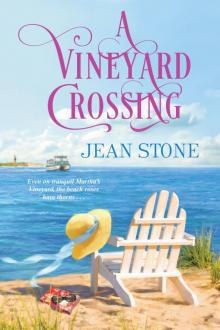 A Vineyard Crossing
A Vineyard Crossing A Vineyard Christmas
A Vineyard Christmas Beach Roses
Beach Roses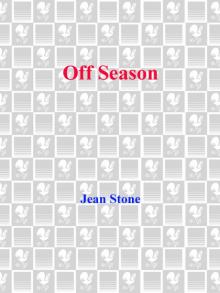 Off Season
Off Season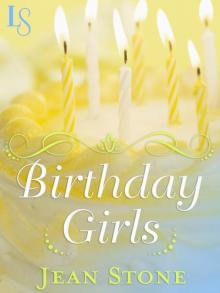 Birthday Girls
Birthday Girls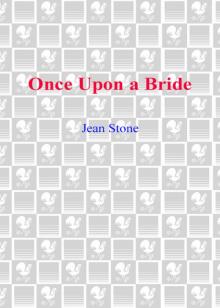 Once Upon a Bride
Once Upon a Bride Places by the Sea
Places by the Sea Trust Fund Babies
Trust Fund Babies The Summer House
The Summer House Tides of the Heart
Tides of the Heart Sins of Innocence
Sins of Innocence Four Steps to the Altar
Four Steps to the Altar Twice Upon a Wedding
Twice Upon a Wedding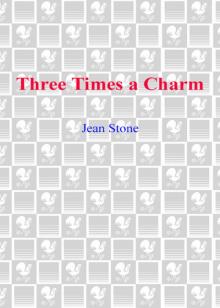 Three Times a Charm
Three Times a Charm